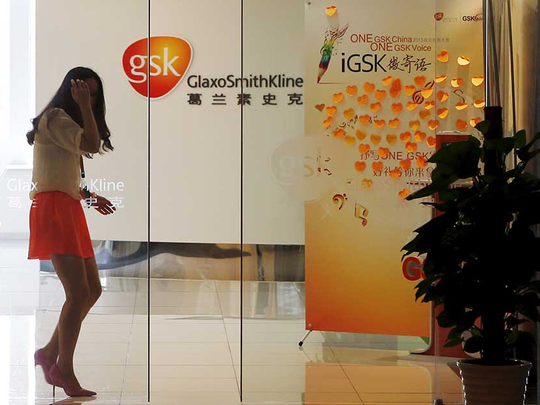
Washington: Pfizer’s $160 billion (Dh587 billion) megadeal with Allergan, which comes with the benefit of an overseas tax address, is likely to be envied by competitors who won’t be able to do much to mimic it.
The idea is certainly alluring. Many large drugmakers, including Johnson & Johnson and Merck & Co, are flush with cash and under pressure from investors to continue to grow quickly. Doing an “inversion” deal to relocate their legal domiciles abroad would give them a lower tax rate and let them use cash earned overseas in the United States without having to pay a 35 per cent levy to repatriate the money.
And Pfizer’s deal, the largest inversion in history, shows that such a transaction is still possible, despite increasing pressure from the Treasury Department and potential changes to the law in the future that could make it harder to invert. Pfizer’s tax rate will drop to about 17 per cent in the first year after closing the merger, Chief Financial Officer Frank D’Amelio said in a conference call with investors Monday. It was 25.5 per cent in 2014.
Yet however attractive an inversion is, pickings are slim for the big companies, said Andrew Weisenfeld, a partner at investment banking firm MTS Health Partners, which focuses on health care.
“There aren’t that many deals of scale out there to do that would be great combinations with a strategic fit,” he said by telephone. “Who would they invert with? How many choices are there? Do they want to do a hostile deal?”
Move quickly
US lawmakers may reform tax laws to make it harder to invert by 2017, said Henrietta Treyz, an analyst at Height Securities, a policy-focused investment firm in Washington. That may push drugmakers to move quickly: “Given it takes six to 12 months to do an inversion deal, if you’re a company that wants to invert, you need to do so right now,” Treyz said.
J&J has a large war chest — $37 billion, including short- term investments — that could be used to purchase drug or device assets. Still, to shift its legal domicile abroad under current law, it’d need to consume a foreign entity that’s at least 25 per cent of its $284 billion size, preferably larger to avoid coming under Treasury scrutiny. Merck, with $60 billion in earnings trapped overseas in 2014 and an average 27.9 per cent effective tax rate over the last three years, could also benefit from moving abroad, but likewise has few choices. It’s valued at $151 billion.
Novartis, Roche Holding, Sanofi, Bayer and GlaxoSmithKline are the only non-US companies around or above $100 billion in market capitalisation, and none of them have been eager to be bought. AstraZeneca successfully fought back a bid from Pfizer last year.
When major inversions have been agreed upon, such as Medtronic’s $42.9 billion merger with Covidien, and Pfizer’s transaction with Allergan, the deal has been friendly. A united front makes it easier to contend with political backlash.
For smaller drugmakers, an inversion deal will still be attractive, and probably more feasible.
“I think unfortunately, when our corporate tax rate is as high as it is, I think companies feel like they need to set aside their loyalty to America for their more immediate loyalty to shareholders,” said Weisenfeld.
Lannett Co and Impax Laboratories Inc, both generic-drug companies, have indicated an interest in doing an inversion, according to Bloomberg Intelligence analyst Elizabeth Krutoholow.
Impax CEO George Wilkinson said at a November conference that his company is seeking to lower its tax rate and that inversion deals are “one of the quicker and more expedient” methods to achieve that goal. Impax would only do an inversion if it made strategic sense, he said.
“I think it’s a, ‘Your peers are doing it, why aren’t you?’ scenario,” said Treyz of Height Securities.
Merck says it doesn’t want to buy a company overseas just for a tax inversion, though current US tax policies do put it at a disadvantage to foreign competitors.
“To remain competitive, we review all alternatives to optimising our tax rate,” the drugmaker said in emailed response to questions on Tuesday. Meanwhile, it’s advocating for tax reforms in the US to create a “more level playing field” for American businesses.
Industry deals
Lannett and Impax didn’t immediately return calls seeking comment. J&J had no immediate comment.
Inversions notwithstanding, the record pace of deals in the drug industry is likely to remain strong, propelled by companies looking to replace older, blockbuster medications with expiring patents. Pharmaceutical and biotech mergers this year have already surpassed last year’s record of $220 billion in deals, according to data compiled by Bloomberg. Including the Pfizer-Allergan transaction, the drug industry has struck 651 deals worth $403 billion this year, the data show.
“Recently, more successful R&D output has helped organic growth, but it has not been enough to close the growth gap for many of the large players,” said Jeffrey Greene, global transactions leader for life sciences at tax and consulting firm EY. “Estimated revenue growth for Big Pharma as a group in 2015 looks like it will be negative for the fourth year in a row.”
Potential buyers may be helped by the recent correction in biotech stocks, which has lowered the value of potential targets. The Nasdaq Biotechnology Index had vaulted to an record high in June, prompting concern about a bubble in the industry. It’s now down 15.7 per cent from that high, hurt by political scrutiny of drug prices.
Celgene Corp, a serial dealmaker that recently bought Receptos Inc and signed a 10-year agreement to collaborate with Juno Therapeutics Inc, is still looking for opportunities. “We’re still hungry,” Peter Kellogg, chief financial officer, said at a November conference. “We are very strong financially, and continue to move forward.” Celgene didn’t immediately respond to a request for comment Tuesday.












